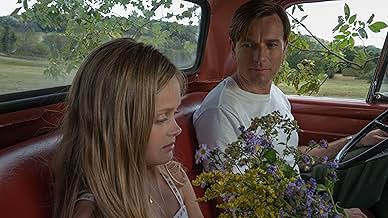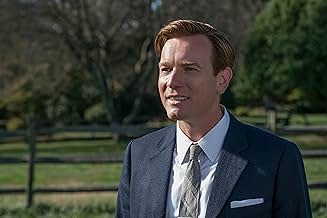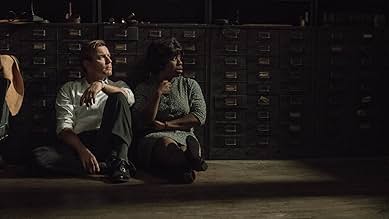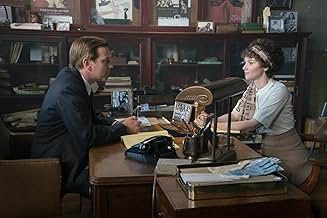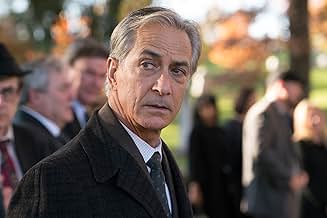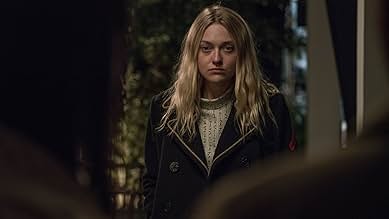American Pastoral
- 2016
- Tous publics
- 1h 48min
Un ancien champion de sport d'université et sa femme ancienne reine de beauté voient leur vie en apparence parfaite s'effondrer lorsque leur fille participe aux troubles de l'Amérique des an... Tout lireUn ancien champion de sport d'université et sa femme ancienne reine de beauté voient leur vie en apparence parfaite s'effondrer lorsque leur fille participe aux troubles de l'Amérique des années 60.Un ancien champion de sport d'université et sa femme ancienne reine de beauté voient leur vie en apparence parfaite s'effondrer lorsque leur fille participe aux troubles de l'Amérique des années 60.
- Récompenses
- 1 victoire et 3 nominations au total
- Merry (8 Years Old)
- (as Ocean Nalu James)
Histoire
Le saviez-vous
- AnecdotesPaul Bettany was cast as Swede, Jennifer Connelly as his wife and Evan Rachel Wood as their daughter. All dropped out in 2004, after the movie spent many years in development. After 10 years, Connelly returned in the lead role, alongside Ewan McGregor.
- GaffesThe newspaper's masthead identifies 1970 as it's "141th Year." Should have been "141st Year."
- Citations
[last lines]
Nathan Zuckerman: [narrating funeral] You come at people with an open mind, and yet you never fail to get them wrong. You get them wrong while you're with them, or you tell someone about them and get them wrong again. That's how we know we're alive. We are wrong. About the Swede, how life was going to open its arms and shower blessings upon him, I was never more wrong about anyone in my life.
- Bandes originalesComes A-Long A-Love
Written by Al Sherman
Performed by Kay Starr
Courtesy of Capitol Records, LLC
under license from Universal Music Enterprises
Seymour "Swede" Levov (Ewan McGregor) and his wife Dawn (Jennifer Connelly) live an idyllic existence in the 1960s in the United States, until the maturity of the couple's daughter, Meredith "Merry" Levov (Dakota Fanning), who will bear the sign of tragedy for the family. Philip Roth does nothing to build the foundations for the disaster: Merry is sexually attracted to her own father, Swede suffers constant pressure because of the racial and social unrest that plagues the surroundings of her glove company, and Dawn, from a woman who knows exactly what he wants, he becomes less faithful to his family. When Merry (Dakota Fanning) begins to suffer social problems in the school and academic environment, it is hell for the Levov family, as a childhood stutter to get her father's attention at the expense of her mother, her thirst for attention reaches political activism. Extremists. In fact, she participates in local terrorist acts, with lethal results, which will affect her family forever.
The novel on which "American Pastoral" was based won the Pulitzer - the "Oscar" of journalism - and the script for a film about the book had been shooting in Hollywood since 2006. Paul Bettany was cast as Swede, Jennifer Connelly as his wife and the couple's daughter would be actress Evan Rachel Wood, when the film adaptation project of the book began in 2004. But over the years, only Jennifer Connelly remained in American Pastoral. The film had its world premiere on September 9, 2016, at the 2016 Toronto International Film Festival, and was released in theaters in the United States on October 21, 2016 by Lionsgate.
The first half feels like McGregor tried to transpose a Douglas Sirk film - a saccharine mid-century suburban reverie with just the right amount of family conflict simmering beneath the surface - into a darker, almost David Fincheresque tone. But whereas Sirk was limited by the strict censors of his day, unable to emphasize the illicit and complex themes of infidelity, sexual misconduct, and classism that were buried in the subtext of his work, McGregor seems to face the reverse problem. He is liberal in showing sexuality, violence and psychological trauma on screen, but he is not very clear about what lies beneath the surface. Having never read Roth's novel, I can't speak to how well the film may have translated the work, thus being forced to judge it on its own merits. But I think I can safely say that the first half of his film is sorely lacking the kind of thematic subtext included in the literature, one that could propel the narrative more gracefully into its tumultuous second and third acts.
The only transparent thematic statement in the opening of "American Pastoral" is explicit, clichéd and a little disappointing - it comes when Seymour "Swede" Levov (McGregor) and his wife Dawn (Jennifer Connelly) are meeting with their daughter Merry's therapist. (Dakota Fanning), Dr. Smith. The psychologist (Molly Parker, from House of Cards) talks incessantly about Merry's apparent Electra complex, and the film immediately jumps to a camping trip with Swede and Merry (12 years old - played by Hannah Nordberg), where Merry essentially tries seduce your father. The camping scene is skillful, disturbing, and well-acted - and would have worked well enough on its own to establish the motivations behind Merry's character. But it's spoiled by the earlier inclusion of blatant exposition in the therapist's office. There are hints of other themes; the evils of perfectionism, the false burden of patriarchy, the misconceptions of fatherhood, etc... but aside from some much-appreciated critiques of the male-dominant nuclear family, these themes are kind of vague and nebulous, floating aimlessly in the background of the screen.
The scene in the therapist's office may serve as a paradigm for the flaws of "American Pastoral." It shines when McGregor allows the audience to connect with the narrative through the strong performances, or simply revel in the absolutely stunning image on screen. But when the film overloads itself with excessive thematization, or simply loudly states its premise in voice-over narration, it feels woefully unimpressive. David Strathairn plays Nathan Zuckerman, a friend of Swede's younger brother, and serves as our secondary source throughout the film. Swede's brother tells Zuckerman the whole story at his 45th high school reunion, turning the film into a framed tale told by two unreliable narrators. At least we don't see much of them, as the film moves away from its narration after the opening scene. However, whenever Strathairn intercedes, especially at the end of the film, he ruins the entire subtext - his narration is overly literal, painfully wordy (a trait explained by Zuckerman reminding us that he is "the famous writer" yawn), and totally unnecessary.
Roth's book is a little more complex than most accounts will tell you. After the first few chapters, in which Zuckerman relates what he personally knows about The Swede and the events of his life, the remainder of the book consists of material that Zuckerman admits to inventing about the man and his story. It's a form of metanarrative, and it goes a long way toward making sense of characters who actually make little sense in a realistic narrative. One such character is Rita Cohen, a young radical who comes into contact with The Swede after Merry runs away and tortures the decent man with radical rhetoric and vehement sexual games. Rita makes sense as a projection of Zuckerman: as a "real" character in this tragedy, she doesn't, but that doesn't stop Romano and McGregor from presenting her as such. (Valorie Curry, who plays the role, struggles to make her believable). When Rita appears, the fake notes begin to overwhelm the real ones. Like an argument between The Swede and Merry about politics, underscored by Buffalo Springfield's "For What It's Worth," a song that has now lost all meaning as a 60s beacon or anything else. Likewise, the film downplays the father-daughter relationship, playing out their verbal exchanges and signaling Merry's rebellion by having her play Jefferson Airplane records too loudly in her room. Romano's script gives Dawn's character more weight, but turns her into something of a hateful harpy in the process. People who accept the contemporary caricature of Roth as a misogynist may not believe it, but the book's portrayal of Dawn is both more sympathetic and more empathetic to her resentment of having been a beauty queen.
Screenwriter John Romano has the job of adapting this work, and "American Pastoral" is a novel that would need a radical makeover to work as a feature film (a short miniseries could have been interesting), but Romano plays it safe, albeit selectively. Its fidelity to the source material is suffocating, the script mimicking the form of Roth's text while abandoning its flow.
There are some strong scenes. The heated arguments between the Swede and his daughter before her disappearance are the closest the film comes to capturing the irreconcilable generational disagreements of half a century ago, with Ms. Fanning's icy tone of moral superiority echoing the extreme left-wing rhetoric of era. But the Vietnam War is just a footnote in a film so condensed that it resorts to the soundtrack's most tired cliché: Buffalo Springfield's "For What It's Worth" to evoke countercultural dissent. The main story line traces Swede's desperate search for Merry. When he is close to giving up hope, he is visited by Rita Cohen (Valorie Curry), a mysterious and sinister go-between for her daughter's revolutionary cell, who taunts him with the hope of seeing Merry, and then humiliates him by playing the temptress. Sadist. Their interactions momentarily set the film on fire.
Much of the book's power lies in Nathan's bitter retrospective dissections of the Swede. But without these complicated reflections, the film's intellectual substance is stripped away, leaving only bones, gristle, and a few fragments. Swede comes to life as a hurt father, but not as an idealist whose foundations of belief are shaken to the core. As the film gallops along at a pace that compresses most plot details into a scant 108 minutes, no time is allowed for the dark reflections that give the novel a tragic-comic dimension. It doesn't help that "American Pastoral" was filmed in Pittsburgh. The pedestrian cinematography and editing give it the look and feel of a bland television movie.
In the inadequate depiction of the riots that devastated Newark in the late 1960s, the violence was reduced to angry skirmishes in the streets. Archival footage of the actual riots barely scratches the surface of the events. "American Pastoral" is a film that raises awareness regarding the upbringing of our children as well as attention to the family, where a slight lack of care can generate catastrophic consequences. And it hurts your heart.
- fernandoschiavi
- 15 nov. 2023
- Permalien
Meilleurs choix
- How long is American Pastoral?Alimenté par Alexa
Détails
- Date de sortie
- Pays d’origine
- Sites officiels
- Langues
- Aussi connu sous le nom de
- El fin del sueño americano
- Lieux de tournage
- Sociétés de production
- Voir plus de crédits d'entreprise sur IMDbPro
Box-office
- Montant brut aux États-Unis et au Canada
- 544 098 $US
- Week-end de sortie aux États-Unis et au Canada
- 149 038 $US
- 23 oct. 2016
- Montant brut mondial
- 2 063 436 $US
- Durée1 heure 48 minutes
- Couleur
- Mixage
- Rapport de forme
- 2.35 : 1
Contribuer à cette page








